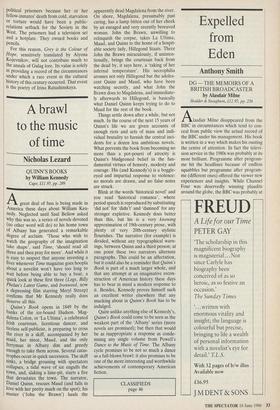A brawl to the music of time
Nicholas Lezard
QUINN'S BOOKS by William Kennedy Cape, f11.95, pp. 289
a
Agreat deal of fuss is being made in America these days about William Ken- nedy. Neglected until Saul Bellow asked why this was so, a series of novels devoted (no other word will do) to his home town of Albany has generated a remarkable degree of acclaim. 'Those who wish to watch the geography of the imagination take shape', said Time, 'should read all three and then pray for more'. And while it is easy to suspect that anyone investing a fiver whenever Time magazine goes hoopla about a novelist won't have too long to wait before being able to buy a boat, a quick look at these first three (Legs, Billy Phelan's Latest Game, and Ironweed, now a depressing film starring Meryl Streep) confirms that Mr Kennedy really does deserve all this.
Quinn's Book opens in 1849 by the banks of the ice-bound Hudson. Mag- dalena Colon, or 'La Ultima', a celebrated Irish courtesan, licentious dancer, and tireless self-publicist, is preparing to cross the river in a skiff, accompanied by her maid, her niece, Maud, and the only ferryman in Albany dim and greedy enough to take them across. Several catas- trophes occur in quick succession. The skiff sinks, a bridge groaning with spectators collapses, a tidal wave of ice engulfs the town, and, slaking a lime-pit, starts a fire that devastates the town. The narrator, Daniel Quinn, rescues Maud (and falls in love with her pretty much on the spot); his master (`John the Brawn') hauls the apparently dead Magdalena from the river. On shore, Magdalena, presumably past caring, has a lump bitten out of her cheek by an enraged and very recently bereaved woman. John the Brawn, unwilling to relinquish the corpse, takes La Ultima, Maud, and Quinn to the home of a hospit- able society lady, Hillegond Staats. There John the Brawn miraculously, if uninten- tionally, brings the courtesan back from the dead by, it says here, a 'taking of her infernal temperature'. His necrophilia arouses not only Hillegond but the adoles- cent Quinn and Maud, who have been watching secretly, and what John the Brawn does to Magdalena, and immediate- ly afterwards to Hillegond, is basically what Daniel Quinn keeps trying to do to Maud for the rest of the book.
Things settle down after a while, but not much. In the course of the next 15 years of Quinn's life we are given accounts of enough riots and acts of mass and indi- vidual brutality to furnish the central inci- dents for a dozen less ambitious novels. What prevents the book from becoming no more than a pot-pourri of atrocity is Quinn's bludgeoned belief in the fun- damental virtues of honesty, modesty and courage. His (and Kennedy's) is a boggle- eyed and impartial response to violence: no morals are drawn, and no false notes are struck.
Blink at the words 'historical novel' and you read 'historical romance', where period speech is reproduced by substituting `did not' for 'didn't' and 'damned' for any stronger expletive. Kennedy does better than this, but his is a very knowing approximation of 19th-century prose, with plenty of very 20th-century stylistic flourishes. The narrative (for example) is divided, without any typographical warn- ings, between Quinn and a third person; at one point these two narrators alternate paragraphs. This could be an affectation, but it could also be a reminder that Quinn's Book is part of a much larger whole, and that any attempt at an imaginative recon- struction of American history these days has to bear in mind a modern response to it. Besides, Kennedy proves himself such an excellent writer elsewhere that any mucking about in Quinn's Book has to be indulged.
Quite unlike anything else of Kennedy's, Quinn's Book could come to be seen as the weakest part of the 'Albany' series (more novels are promised); but then that would be as inappropriate a response as conde- mning any single volume from Powell's Dance to the Music of Time. The Albany cycle promises to be not so much a dance as a full-blown brawl: it also promises to be one of the more interesting and worthwhile achievements of contemporary American fiction.


















































 Previous page
Previous page